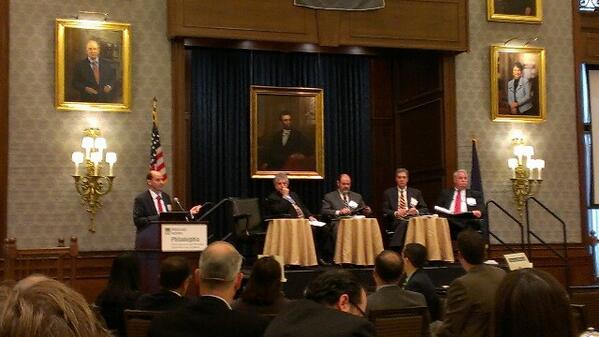 Went to a fundraiser for David Oh last night. Ate more than my donation amount in chips and hummus. Schmoozed with David and his supporters. Had a great time. So I'm biased...but I think David is a great guy. If you followed him for a day or even just read his weekly schedule, you'd see just how much of a public servant he is to all the people of Philadelphia.
Went to a fundraiser for David Oh last night. Ate more than my donation amount in chips and hummus. Schmoozed with David and his supporters. Had a great time. So I'm biased...but I think David is a great guy. If you followed him for a day or even just read his weekly schedule, you'd see just how much of a public servant he is to all the people of Philadelphia. One of the things I like about David, though, can sometimes be seen as a liability, at least come election time. David thinks deeply about important issues, and wants to engage others in complex ways towards complex solutions to complex problems. Because life isn't simple, and the things that vex us as a city are not simple.
One of the things I like about David, though, can sometimes be seen as a liability, at least come election time. David thinks deeply about important issues, and wants to engage others in complex ways towards complex solutions to complex problems. Because life isn't simple, and the things that vex us as a city are not simple.Alas, too much of what passes for political debate and policy evaluation - not just in Philadelphia but on national and global issues - is overly simplified. We're all about the sound bite, the dog whistle, and the "you're either for us or against us." It's easier, funner, and more effective to smear the other guy and to paint issues in stark contrasts than to really hash through nuances, listen to the other side, and try to come together in new ways.
David's no good at that. He's trying to get into the weeds, where the real roots lie. He's willing to listen, compromise, work hard, and take his licks. I appreciate that, even if it's not valued or even devalued by most. Although I'm saddened that there isn't more depth to the overall discourse.
Let me offer another positive example. Yesterday, my partner Peter Angelides moderated a panel at an Urban Land Institute event on why real estate development costs are so high in Philadelphia. He also presented the findings of a study our firm is working on on this very topic. I think I can speak for the very large audience in the room with me, since I was looking around to see, when I say that this is a topic of great interest and relevance.
Unfortunately, the kind of discourse we had yesterday is rare on this topic. It is thought by many that it is the unions that are at fault. It is thought by the unions that they are not at fault. And that is about as deep as many people get on the issue. Which is unfortunate, because the real reasons are myriad, and to the extent that unions play a role, it is better to engage them than to vilify them or dismiss them. But hey, who wants to actually tackle a thorny and multi-faceted problem when we can just get our shots in and look good doing it? And so I'm grateful for the hard work Peter has done on the report, and for the venue we had yesterday to really engage a diversity of thought leaders in meaningful conversation on a topic of grave importance to the future vitality of our city.
Even though I'm well-educated on government matters and get paid to do complicated analyses, I don't think my call for less shallow thinking can only be answered by an elite few. I'm not asking for everyone to become an economist or a policy wonk. I am asking everyone to acknowledge that the real world is complicated. No matter what your educational background or station in life, surely you would agree that the really important things in life defy easy stereotypes and pat answers. We don't treat our family issues or our personal baggage in this way. Let's not treat big public issues that way either.


No comments:
Post a Comment